September 17, 2021
Air Date: September 17, 2021
FULL SHOW
SEGMENTS
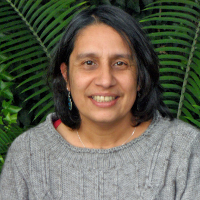
Call To Delay UN Climate Summit
View the page for this story
As COVID-19 spread continues and vaccine access remains limited in some of the countries most vulnerable to climate impacts, civil society is calling for a delay of the much-anticipated COP26 climate summit planned for Glasgow, Scotland this November. Host Steve Curwood talks to the Executive Director of Climate Action Network (CAN) International, Tasneem Essop, to understand why her coalition , which has official observer status at the UN Climate negotiations, is calling for the postponement, the injustices of institutional racism, and what can be seen as a vaccine apartheid. (12:56)
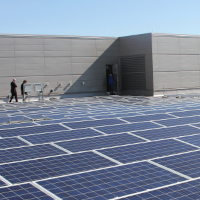
Getting The US Grid To 40% Solar
View the page for this story
The Biden Administration's goals include decarbonizing the energy sector by 2035 and a recent report by the Department of Energy provides a blueprint for how solar power can produce up to 40% of the nation's electricity by then. To reach that goal, the United States will need to quadruple its annual solar installation, a project that will require significant investments and a transformation of the grid. DOE’s Becca Jones-Albertus joined Living on Earth's Bobby Bascomb to discuss this overhaul and how it can be equitable. (08:42)
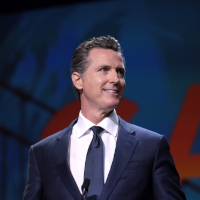
Rejecting Recall, California Keeps Its Cool On Climate
/ Jenni DoeringView the page for this story
California voters roundly rejected a Republican bid to recall Governor Gavin Newsom, who has set the state on a path to a low-carbon future. Living on Earth’s Jenni Doering discusses with Host Steve Curwood why the stakes for the climate were so high in this recall election. (04:47)

Beyond the Headlines
/ Peter DykstraView the page for this story
For this week's trip beyond the headlines, Host Steve Curwood and Environmental Health News editor Peter Dykstra take a look at manatees and the decline of their crucial food source, sea grass. Then, the two discuss a survey showing Generation Z's proclivity towards green, climate-focused jobs. Finally, Steve and Peter think back to President John F. Kennedy's first address to the United Nations. (04:55)
Harvard Finally Divests
View the page for this story
Harvard University announced that it will no longer invest in fossil fuel companies, following years of refusal in the face of a prominent and vocal divestment campaign. Harvard is the richest University in the world with an endowment totaling nearly 41 billion dollars. And it is now among the largest organizations to divest from fossil fuels, joining thousands of pension funds, faith groups, and other institutions. Host Steve Curwood spoke to Isha Sangani, a student organizer, and Caleb Schwartz, an alumni coordinator of the campaign. (10:04)
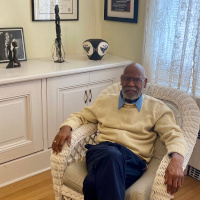
Remembering Our Colleague Thurston Briscoe
View the page for this story
On August 16th Living on Earth lost a dear friend and colleague, producer and public radio executive Thurston Briscoe. Host Steve Curwood spoke with former colleagues to look back on Thurston’s life and long career as a jazz and arts producer at NPR and WBGO, the nation’s premier public radio jazz station. (05:16)
Show Credits and Funders
Show Transcript
210917 Transcript
HOSTS: Steve Curwood
GUESTS: Becca Jones- Albertus, Tasneem Essop, Don Lee, Becca Pulliam, Isha Sangani, Caleb Schwartz
REPORTERS: Jenni Doering, Peter Dykstra
[THEME]
CURWOOD: From PRX – this is Living On Earth.
[THEME]
CURWOOD: I’m Steve Curwood.
With the pandemic still raging worldwide, observers are calling for a delay of the climate summit in Scotland as some developing countries with little vaccine are being red listed for travel.
ESSOP: Being a red listed country and at the same time being vulnerable to the climate crisis, these two coincide. It is absolutely unacceptable in this day and age, that we would sit with this kind of vaccine apartheid.
CURWOOD: Also, a call for equity in domestic solar energy development:
JONES-ALBERTUS: It's so critical that as we increase the amount of benefits that can come from solar deployment that that happens in a way that can benefit all Americans. So there's opportunities for job growth and solar on rooftops can save households significant money on their electricity bill.
CURWOOD: That and more this week on Living on Earth – Stick Around!
[NEWSBREAK MUSIC: Boards Of Canada “Zoetrope” from “In A Beautiful Place Out In The Country” (Warp Records 2000)]
[THEME]
Call To Delay UN Climate Summit
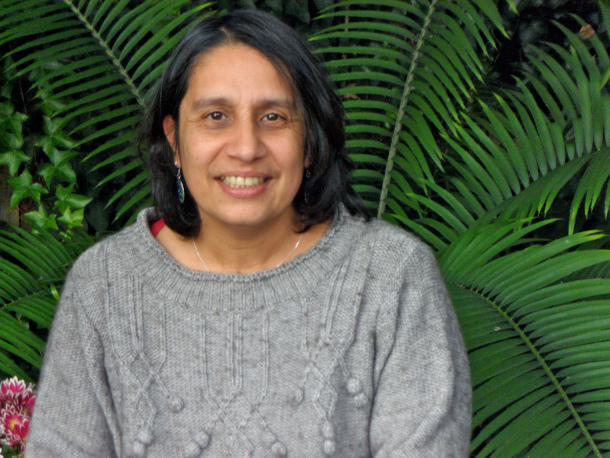
Tasneem Essop is the Executive Director of Climate Action Network International. (Photo: Courtesy of CAN International)
CURWOOD: From PRX and the Jennifer and Ted Stanley Studios at the University of Massachusetts Boston, this is Living on Earth. I’m Steve Curwood.
With the pandemic still raging, many observer parties at the United Nations climate negotiations are calling for a postponement of the COP26 summit, when countries are expected make further commitments under the Paris agreement and adopt certain rules. As many as 25,000 people are slated to attend the gathering in Glasgow, Scotland in November but such a large gathering poses serious health risks, especially for the unvaccinated. Many of the poor countries with the least access to vaccines are the same countries most at risk to devastating climate disruption. And while US climate envoy John Kerry and COP26 host Boris Johnson say it must go on as scheduled, given the pandemic has already delayed it a year, others say that view is insensitive to the economic and social divides between the Global North and Global South. Tasneem Essop is the Executive Director of the Climate Action Network, one of the official UN observers that is calling for postponement of COP 26 until all participants including civil society can access the vaccine. She joins us now from near Capetown South Africa. Tasneem, welcome to Living on Earth.
ESSOP: Thank you very much, nice to be here.
CURWOOD: So, as we're talking and recording this conversation, there's some 60 countries and territories on the UK's, so called red list. That is, travelers from those countries would have to undergo strict testing and quarantine rules in order to even enter the UK. What would that mean for the climate talks to miss out on representatives from those countries? Or those that go through the quarantine, I gather, that's rather expensive, isn't it?
ESSOP: Yeah. Well, let me just say that after our call for postponement, the UK Government conceded and said that they would pay for quarantine of delegates who have badges. Right, so not for everybody. There's a whole other set of issues related to quarantines. You know, because there are expectations, maybe in other countries, that you need to quarantine before you head off, as you would know, from one hub to the other there's different rules. But be that as it may, they conceded on that one. But if we look at the red listed countries, as you said there's 60, and you saw who they were, you would also immediately recognize that these are the poorest and most vulnerable countries in the world. Being a red listed country, and at the same time, being vulnerable to the climate crisis, these two coincide. That is absolutely unacceptable in this day and age, that we would sit with this kind of vaccine apartheid. And if you're not at the decision-making tables in a proper, inclusive, equitable way, then we are sitting with a problem.
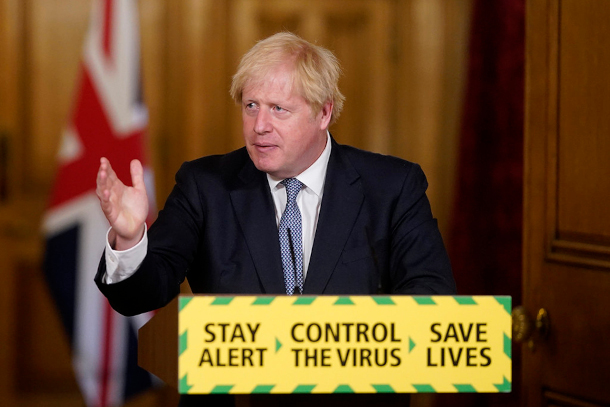
Prime Minister Boris Johnson giving a statement on the coronavirus pandemic in July 2020. (Photo: UK Government, Wikimedia Commons, OGL v.3)
CURWOOD: You mentioned vaccine apartheid, you're speaking to us from South Africa, which had a tragic history of apartheid. To what extent do you think that vaccine apartheid is connected to how we are handling internationally the climate crisis? What could be the price of that?
ESSOP: When we talk about the history of our world, and how it is that in this world that we live in right now, you still have this massive inequality, and that the fault lines of those massive inequalities remain the same. You in the U.S., for example, you would know that during the pandemic, what were the fault lines? That in the U.S., it was mainly those communities, black, people of color, indigenous, etcetera, that suffered the impact of the pandemic the worse. Now, with the climate crisis, those fault lines are exactly the same. The issue will be that those in the north who are well resourced will have the means and the abilities and the technologies to be able to deal with the crisis far better than those who are living in the vulnerable south. Far better. The impacts will be global. The reality is, that is a form of apartheid. The haves, and the have nots. It generally is the have nots are going to be those who are people of color, indigenous from the global south, people of color in the global north, black people, etcetera, etcetera. That is the story of the world.
CURWOOD: Tasneem, for years, the UN Framework Convention on Climate Change, the body that holds these conferences of the parties to negotiate climate, have had a basis in institutional racism, some would say. For example, the original Kyoto plan talked about Annex 1 countries that were pretty much all white, and Non-Annex, or then later called Annex B countries, that were all pretty much the countries of color. The explanation was that the Annex 1 countries were industrial and that the others were developing. Yet, you know, Brazil makes airplanes, and I don't think Bulgaria does. So, to what extent is this call to continue with the Conference of the Parties part of a system of institutional racism?
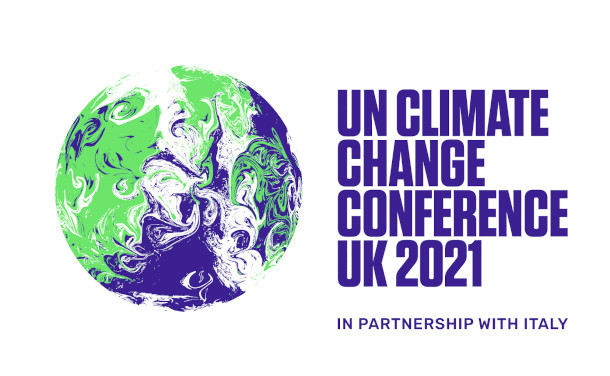
The official logo of the 26th UN Climate Change Conference of the Parties. (Photo: UK Government, Wikimedia Commons, OGL v.3)
ESSOP: Both, in terms of our experiences with the pandemic, and what we know about the climate crisis, who is historically responsible for the cause of climate change? Who's bearing the worst burdens of the impact of that crisis? Well, you will see it is rooted, not just in you know, institutionalized racism, but it's rooted in systems of colonialism, of imperialism, and the history of development, and industrialization, and also under development, and deliberate under development. So of course, we can't deal with a global crisis like climate in a way that ignores the roots of these problems, these systemic problems causing these crises. Now, the lesson from the pandemic, which is extremely, of course, disturbing, is when we are faced as humanity with a global crisis like the pandemic, and so too the climate crisis, if their response is to then say, we'll take care of our interests first, we'll take care of our company's interests first, before we will take care of another person living in another country. That lack of solidarity, of support, of just simple empathy is extremely worrying, for me, personally.
CURWOOD: Let me ask you something specific here. In terms of the COP, what's the benefit to having an in person set of climate negotiations as opposed to attempting, say, they create a virtual conference space now?
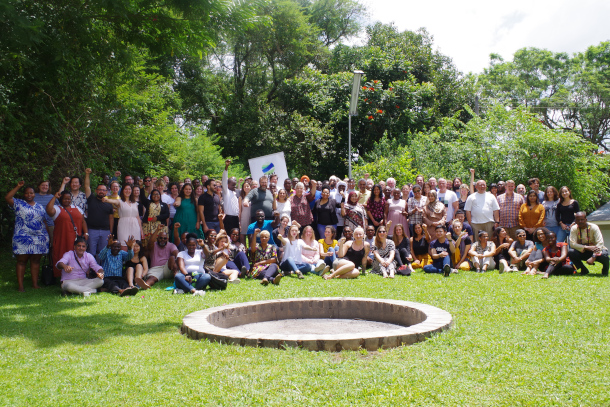
Staff and members of CAN International in Arusha, Tanzania during an annual strategy session. (Photo: Mickeyeva, Wikimedia Commons, CC BY-SA 4.0)
ESSOP: So Steve, you know, these negotiations are really tough. I mean, there's ongoing battles, you know, that it's taken many, many years to even get to a Paris Agreement. And it is tough, not because people are just trying to be difficult, it's tough exactly because of the issues that you speak to, you now, about all these institutionalized systemic challenges. But the nature of negotiations requires people to be together, look each other in the eye. It needs to be about building relationships, that relationship of trust that needs to be built up to deal with such a global crisis, in a context where, you know, people their track records haven't been proven good enough, etcetera, in terms of fulfilling commitments. That requires the personal engagement.
CURWOOD: Tasneem, how trustworthy are the rich and fully developed nations when it comes to dealing with climate. For example, in 2009, in Copenhagen, that promise was made that $100 billion a year would be provided by the rich countries to the poorer countries to help deal with climate disruption. To what extent have the rich countries delivered on that promise?
ESSOP: They haven't. And this is our big problem. You know, it's a decade ago that they made that commitment. And this 100 billion commitment by 2020, which was last year, was not fulfilled. And so there's a huge credibility gap. So please, fulfill your commitments, build the trust based on that. And then I'm sure that, you know, everybody will want to step up to do their fair share of what needs to be done to address this climate crisis.
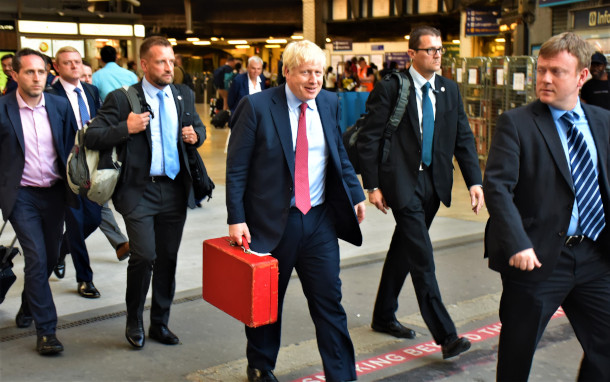
Boris Johnson, Prime Minister of the United Kingdom and host of COP26, scheduled to be held in Scotland November 2021. (Photo: David Sedlecky, Wikimedia Commons, CC BY-SA 4.0)
CURWOOD: Now, COP26, has already been postponed once before. It was originally slated to happen in November of 2020. What does it mean for climate negotiations for it to be pushed, later yet again?
ESSOP: Let me be very clear that the Climate Action Network has, is now over 30 years old. We've been working to fight the climate crisis for that long. We've been in this process of the UNFCCC, since its inception. There isn't another massive civil society network like ours that have dedicated its time, commitment, and energy to address the climate crisis. So, it was very difficult for us to make this call. But what we recognize is that the risks, again, this time round, will have an impact on the ability for this COP to be inclusive, not just only of the government delegations, but civil society, a critical voice, the voice, that keeps the pressure on these governments to act, you know, with urgency and ambition. What we're saying is, just delay it for a few months until we do get all these ducks in a row. Of course, we know that we don't have any control over the pandemic, but we do have control over vaccine rollout. And rich nations can do better in terms of that. And right now, we've been engaging, as we said, with the UK Government since May this year, not just CAN, but other observers, and right now, we still don't have a full picture of what their plans are to ensure a safe COP and an inclusive COP.
CURWOOD: As you see it, now, what do you think is the likelihood of the UK postponing an in-person COP?
ESSOP: Well, you know, Steve, they've been very clear that they will not postpone. And we've understood that right? They've been very clear right up until our engagement with them on Friday past that they have no intentions of postponing the COP. When we made the call for postponement, we did not say we will boycott because we understand it is our responsibility. And so, if the UK Government does go ahead with a COP, we will be there. Limited, but we will be there.
CURWOOD: How do you feel about that?
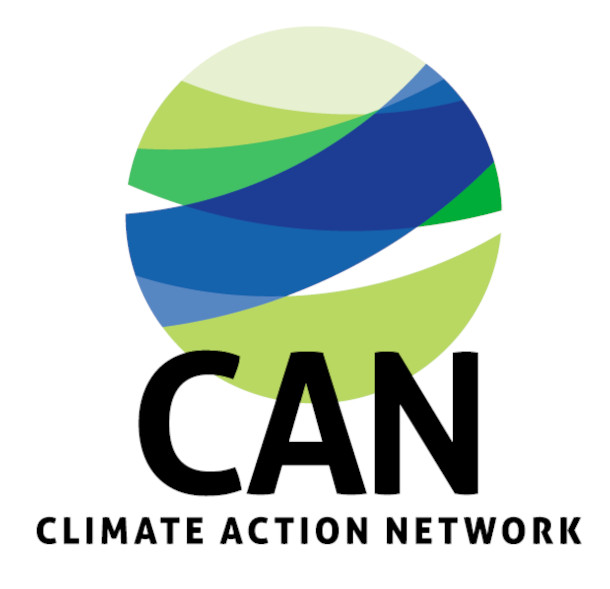
Climate Action Network’s official logo. (Photo: Climate Action Network, Association, e.v., Wikimedia Commons, CC BY-SA 4.0)
ESSOP: I feel, you know, at a very personal level, you know, we've been put under this, you know, duress essentially, right? It's highly, it makes me feel anxious that we've been dedicating our lives to fight the climate crisis. These COPS are important moments, of course, to keep the momentum and the pressure, etcetera. But that we are now going to have to make this choice, potentially risking your life, actually, because even the UK admits that they expect that there will be Coronavirus infections at the COP. So, we have to make that choice. And because the pressure has been put in the way that says, if we don't have this COP, this is the last chance to basically save us or, you know, keep 1.5 degrees alive kind of messaging. That puts a further burden on us. But no government has to wait until Glasgow to already start. They should have. Their national commitments were supposed to be ambitious. They were supposed to deliver those last year already. Many of them did not. So, they need to do the things they're committed to do.
CURWOOD: Tasneem Essop is the executive director of the Climate Action Network International. Thank you so much for taking the time with us today.
ESSOP: Thank you very much. Thanks, Steve. Thanks for inviting me onto your show. Really appreciate it.
CURWOOD: Our pleasure.
Related links:
- Climate Action Network Main webpage
- UK Government Red listed countries and restrictions
- Climate Action Network Statement for COP26 postponement
- Tasneem Essop’s CAN Profile
[MUSIC: Hugh Masekela “Grazing in The Grass” on The Promise of a Future, Uni Records]
CURWOOD: Coming up – America could meet many of its commitments under the UN climate agreement with solar power if Congress funds it. Keep listening to Living on Earth.
ANNOUNCER: Support for Living on Earth comes from Sailors for the Sea and Oceana. Helping boaters race clean, sail green and protect the seas they love. More information at sailors for the sea dot org.
[CUTAWAY MUSIC: Herbie Hancock, “Cantaloupe Island” on Cantaloupe Island, by Herbie Hancock, Blue Note Records]
Getting The US Grid To 40% Solar
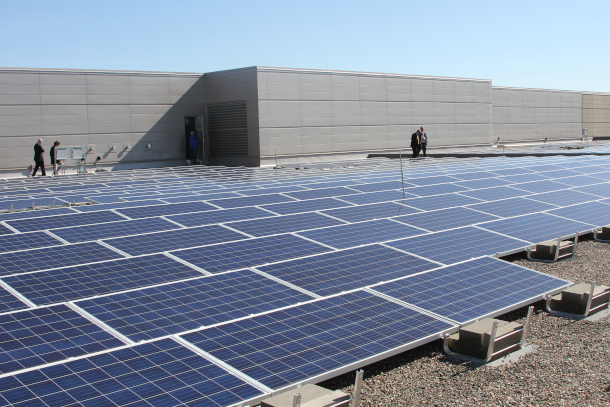
Solar panels on top of Minnesota’s Senate Building. (Photo: MN Senate DFL, Flickr, Public Domain)
CURWOOD: It’s Living on Earth, I’m Steve Curwood.
Well for the United States to keep up its end of the bargain in international climate talks we will need to curtail emissions dramatically in the next decade. And shortly after taking office President Biden announced targets to do just that. He outlined a goal to create a carbon pollution free power sector for the United States by 2035 and a net-zero emissions economy by 2050. A recent report from the Department of Energy finds solar could be a huge part of the carbon-free energy mix, with the potential to cut consumer energy costs, power roughly 40% of the US by 2035 and create up to 1.5 million jobs. But time will tell if the Biden Administration will get the funding from congress in time to legitimately put this plan on the table at the climate summit. For details we turn now to Becca Jones-Albertus, Director of the Solar Energy Technologies Office at the US Department of Energy. She spoke with Living on Earth’s Bobby Bascomb.
JONES-ALBERTUS: Thank you so much, Bobby. Great to be here.
BASCOMB: So where would the solar energy come from for this project? Are we talking about rooftops, community projects, massive arrays, or maybe all of the above?
JONES-ALBERTUS: Definitely all of the above. So today and just for context, we have about 80 gigawatts of solar on the grid, about 3% of US electricity, we're looking to as we decarbonize the grid is getting to like 1000 gigawatts and more than 10 times as much, you know, to provide about 40% of us electricity. So, to get there, we're talking about dramatic expansion in the amount of rooftop solar, as well as solar on commercial buildings and a large growth in the number of large-scale solar projects as well.
BASCOMB: What is the current price on average for a unit of energy from solar versus fossil fuels? And how does that compare to a decade or two ago?
JONES-ALBERTUS: So today, in many parts of the country, solar is actually the cheapest source of new electricity generation. The cost of solar depends where exactly you are in sunnier regions of the country; cost can be even lower. And with tax credits, we're seeing prices that are below three cents a kilowatt hour for bulk wholesale electricity. On average, across the country, we look at the cost of solar electricity, without subsidies, that's kind of our benchmark. And the average, or typical cost across the country we see now is about four and a half cents a kilowatt hour. So this is an 80% reduction in cost since from where we were just a decade ago. So tremendous reduction in costs, and it's making solar again, in many parts of the country cheapest way to add new capacity. And in some parts of the country, it's now cheaper than operating existing capacity during times when the sun's out.
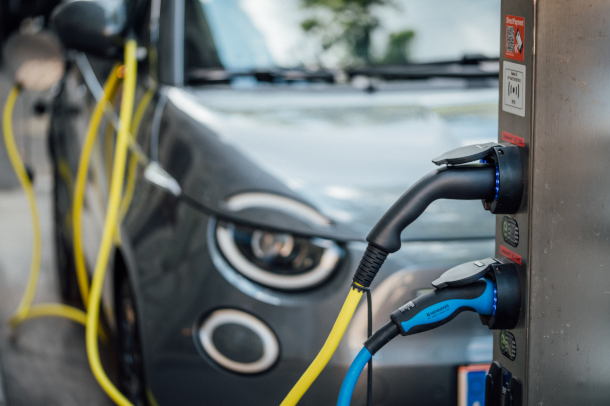
Charging stations for electric vehicles are part of the $3.5 trillion budget bill currently being discussed in Congress. (Photo: Ivan Radic, Flickr, CC BY 2.0)
BASCOMB: Well, that makes sense. I mean, it stands to reason that solar energy would be cheaper in a place like Arizona as compared to say Alaska.
JONES-ALBERTUS: Yes, the solar resource in the US is strongest in the in the southwest of the country. And so solar is, you're going to see the lowest prices for electricity in places like Arizona, but actually solar can be affordable across the country. And the amount of sunlight doesn't vary by more than you know, about a factor of two across the country. So we're really seeing solar growth across the entire country. And all of our working targets are aiming for solar to be an energy source for all of the United States.
BASCOMB: Now, what about the potential for solar in the transportation sector? You know, several car manufacturers, including Ford and GM, are fast tracking their plans for electric vehicles, pledging to introduce in some cases, an entire fleet of new electric vehicles in just the next few years? How might solar energy fit into that mix?
Hurricane Ida did more damage to Louisiana's electrical grid than any other storm in the history of the state, a local power company said.https://t.co/HOx7CyraQd
— NewsChannel 5 (@NC5) September 6, 2021
JONES-ALBERTUS: Yeah, so you know, the trends with electric vehicle adoption are a really important part of decarbonizing our energy system as a whole. And there's a really nice opportunities for synergy with solar and with electric vehicles in particular, you know, there are solar energy stations that are being set up to help with EV charging, and better integration of solar and EVs can enable EVs to be charged when there's surplus solar on the grid. And therefore, they can take advantage of a really cheap source of power, you know, when there is flexibility and when that charging occurs. And EVs are also being looked at as how they could be a grid resource and when coupled with solar to be able to provide better resilience to the grid if needed, and provide greater services to support the reliability and the resilience of the grid, over time. We're not there yet, but there's a lot of exciting work looking at how we can use solar and EVs together to better support the grid.
BASCOMB: Well, what kind of large-scale infrastructure changes would be needed to transition from an energy grid that's largely driven by fossil fuels as we have today, to one that's largely powered by the sun?
JONES-ALBERTUS: Transitioning to an electric grid that's powered by solar along with wind and increasing amounts of energy storage will involve operating the grid in a different way. Today, our grid is built around generators that rotate and provide inertia to the grid and that's a form of how we get reliability to the grid. Solar and wind and batteries connect to the grid through power electronics. And so the way that they interface and the way that they provide reliability services to the grid is fundamentally different, and will require new learning and new experience in how we operate a grid in that way. But we know that we can operate a grid like that and maintain its reliability. We do expect as we build out solar and wind to see significant expansion of the transmission system and significant additions of energy storage to the grid, because both solar like wind are variable the sun's not always shining and wind’s not blowing and so both energy storage and transmission can help ensure that we have enough power supply or energy supply for when that energy is needed.
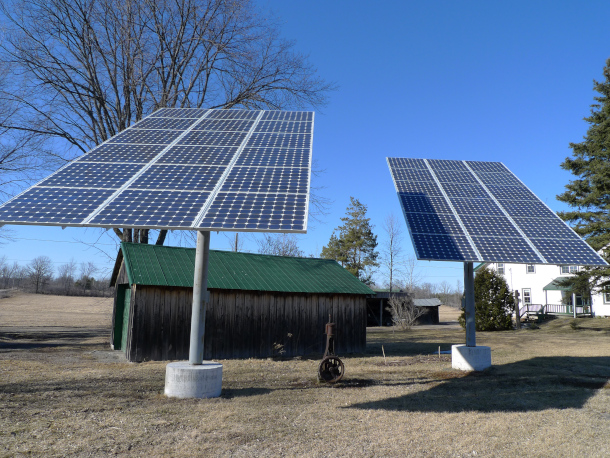
The Biden Administration hopes to use tax credits to incentivize the use of solar power systems and batteries at residential areas and businesses. (Photo: Christine, Flickr, CC BY-SA 2.0)
BASCOMB: Well how can the benefits of solar energy and things like cleaner air and in some cases, lower utility bills, how can that be distributed equitably across the country and for that matter maybe the jobs that come along with ramping up solar?
JONES-ALBERTUS: So glad you brought up equity because it's something we're really thinking hard about and working toward is an equitable transition to a decarbonized economy and energy system. It's so critical that as we increase the amount of benefits that can come from solar deployment, that that happens in a way that benefits all Americans. So yes, in particular, as we scale up solar deployment, that comes with job growth. In fact, the Bureau of Labor Statistics cites solar installer as one of the top three fastest growing jobs they expect over the next decade. And they're probably not using even our most aggressive assumptions for how much solar deployment could grow. And so there's opportunities for job growth solar that's deployed on rooftops and commercial buildings can provide opportunities when it's paired with storage to enhance energy resilience, something that can become you know, more and more important, as we're unfortunately, seeing larger numbers of extreme weather events and disasters. You know, we can really build greater community resilience if we're thoughtfully installing solar and energy storage. And we want to do that so that the communities that can be maybe the hardest hit or in the most in need of that resilience are receiving it. And then of course, solar has the potential to create financial savings. And solar on rooftops today can save households in many areas of the country, significant money on their electricity bill, but you have to be able to afford to put solar on your rooftop or you have to you know own a home, you have to have a good credit score to qualify for a loan and that is obviously not available to many, many members of the country. In fact, you know, we estimate about half of all American households won't have access to rooftop solar, either because they rent a home or, or they have shading on the roof or, or financial barriers. And so we're also putting a lot of investment in something called community solar, which is a large solar installation that households can get a share of and that can be treated as though it were on your roof in terms of financial savings. And that can provide an opportunity then for all households to receive some of these financial benefits that can come from rooftop solar. So we have at DOE the National Community Solar Partnership, which is we have over 500 partners that are working together with us to develop really effective models for affordable community solar and to expand that access to all American households.
CURWOOD: That’s Becca Jones- Albertus the Director of the Solar Energy Technologies Office at the US Department of Energy, speaking with Living on Earth’s Bobby Bascomb
Related links:
- PBS | “Biden’s Proposed Tenfold Increase In Solar Power Would Remake The U.S. Electricity System”
- The New York Times | “From 4% to 45%: Energy Department Lays Out Ambitious Blueprint for Solar Power”
- Learn more about “The Biden Plan to Build a Modern, Sustainable Infrastructure and an Equitable Clean Energy Future”
- Learn more about the Solar Futures Study by the Department of Energy
- Reuters | “Biden Infrastructure Plan Takes On EV Charging’s Inequality Problem”
[MUSIC: Entrain, “Hear That Long Snake Moan” on Entrain, by Entrain, Dolphin Safe Records]
Rejecting Recall, California Keeps Its Cool On Climate

Governor Gavin Newsom has avoided recall and remains as California’s governor. (Photo: Gage Skidmore, Flickr CC BY-SA 2.0)
CURWOOD: On September 14th California Governor Gavin Newsom avoided a Republican effort to recall him, and you could say the climate also avoided a Republican rollback. California has been a leader in the nation and the world on the climate for years and in 2006 it became the first state in the country to place broad caps on carbon dioxide and other climate-warming greenhouse gases. California has also played a key role in showing the world a continued American commitment to reduce emissions even as the Trump Administration pulled the US out of the Paris Climate agreement. For example, last year Governor Newsom set an ambitious goal to phase out gas-powered vehicles completely in California by 2035. LOE’S Jenni Doering has been following the recall election and joins me now for details. Hi Jenni!
DOERING: Hi Steve!
CURWOOD: So, how are folks in California reacting to the election?
DOERING: Well even though much of the campaign rhetoric revolved around the pandemic there’s sort of a collective sigh of relief among climate conscious folks across the country. I called up Cara Horowitz, she’s co executive director of the Emmett Institute on Climate Change and the Environment at UCLA’s School of Law, to get her take.
HOROWITZ: Californians care deeply about doing something on climate change not out of some altruistic or save the planet set of goals, but because we see, you know, when we look outside our windows that this is affecting our communities. It’s causing wildfires that are blanketing our cities with choking wildfire smoke and causing evacuations and deaths; it’s causing droughts; it’s really making life in California more difficult in ways that are palpable to communities across the state and so I have to believe that was in their heads as they turned up at the polls.
CURWOOD: No kidding -- so Jenni what kinds of climate policies specifically were at risk?
DOERING: Well, the Governor really has a lot of power over the climate agenda. Newsom already set a goal to phase out new fracking permits within 3 years. Cara Horowitz says of the 46 mostly Republican candidates to replace Governor Newsom the top vote-getter Larry Elder, a big Trump supporter, would have been a disaster for the climate.
HOROWITZ: Our state’s goal to become carbon neutral by 2045 really depends only on who’s governor and those things would have been toast under Larry Elder. I don’t think it’s exaggeration just to say boldly that the Republican frontrunner really had environmental regulation in his sights. He’s called climate change a hoax, he talked very openly about ending what he calls the war on oil and gas extraction in California.

Larry Elder was the top contender to replace Gov. Newsom in the 2021 California Recall election. (Photo: Gage Skidmore, Flickr CC BY-SA 2.0)
DOERING: And there are other ways the governor can control climate policy.
HOROWITZ: And those include things like agency appointments, who’s on the board or heads the California Air Resources Board, which is the state agency that essentially develops California climate policy.
DOERING: A shift in power would have impacted the business community too. Here’s Samantha Gross, director of the Energy Security and Climate Initiative at the Brookings Institution.
GROSS: At the national level we’ve seen a lot of flip-flopping on climate policy and that’s a difficult environment in which to run a business. Whereas California policy has been much more consistent over time and much more clear.
DOERING: She says it’s also led the way in showing how whole economies can transition away from fossil fuels.
GROSS: California’s a real leader in renewable energy in the United States, and California and the Newsom administration have really shown that you can operate a grid with a higher level of renewables than many thought possible right now.
CURWOOD: Yeah, in the world’s fifth largest economy too.
DOERING: Right, and Professor Horowitz says that California’s global role became crystal clear for her on a trip with students to one of the big UN climate talks.
HOROWITZ: We were walking down a corridor next to some delegates from another country who were obviously party delegates and I actually don’t know what country they were from but they were from an African country and we heard them speaking in their native tongue and didn’t really understand what they were saying, except, punctuating their conversation periodically would be the phrase, “AB 32,” and “Fran Pavley,” which is of course a reference to California’s landmark climate change bill, AB 32 which was sponsored by Fran Pavley in the legislature. And it was really a remarkable moment because it brought home for us that California’s influence is not just theoretical but real.
DOERING: And of course, the Biden administration aims to reassert U.S. leadership at the next climate summit. If climate champion Gavin Newsom had been tossed out of office that would have been a lot harder. And Steve, Governor Newsom had pretty much the same margin of victory as President Biden in California so the Democrats should be feeling pretty confident that their base is behind them on the pandemic and climate issues.
CURWOOD: Thanks, Jenni!
DOERING: Sure thing!
CURWOOD: That’s Living on Earth’s Jenni Doering.
Related links:
- The New York Times | “California Recall Vote Could Weaken the State’s Aggressive Climate Policies”
- CNBC | “California’s Battle With Climate Change is at Stake in Tuesday’s Recall Election”
- EcoVote | “The Recall Election is a Threat to California’s Climate Progress”
[MUSIC: Dr. Michael White, “Give It Up” on Dancing in the Sky by Michael G. White, Basin Street Records]
Beyond the Headlines

A mother manatee and her calf. (Photo: Sam Farkas, NOAA Photo Library, Flickr, CC BY 2.0)
CURWOOD: It's time now to take a look beyond the headlines. And for that we turn to Peter Dykstra. He's an editor with Environmental Health News, that's EHN.org and DailyClimate.org. And I think he's on the line now from Atlanta, Georgia. Hi there, Peter. You there?
DYKSTRA: I am. How’re you doing, Steve?
CURWOOD: Good. How’re you doing, what you got for us today?
DYKSTRA: A little concerning news about a beloved species. Manatees have been battling back from a number of threats over the years. The most recent one, and it's a big one, is the decline in seagrass in Florida waters. That's very much in keeping with the decline of seagrass in places around the world.
CURWOOD: What are we losing in terms of manatee numbers?
DYKSTRA: 600 dead manatees this year alone. In the past, there have been boat collisions, pollution, algae blooms which are more frequent in Florida due to warming waters and climate change, and even more acidic waters, also a result of climate change.
CURWOOD: Oh no, the manatees are so adorable and big and lovable and it's seagrass we're talking about, is the problem?
DYKSTRA: Right, and they're sometimes called sea cows, so they eat sea grass. Also think of another crisis in US waters that was largely caused by a decline in seagrass. And that's the Chesapeake Bay. It's battled pollution and habitat change for 50 years. Blue crabs and oysters, two of the biggest food crops that come from this legendary seafood capital on the East Coast need seagrass. As the seagrass declines, the waters also get more turbid and muddy. It's taken a half a century for people to realize and to begin to fix the problem. Seagrass is coming back slowly. Let's hope the same thing can happen in Florida waters for the manatees.
CURWOOD: Let's hope so. Peter, do you have any kind of good news for us this week?
DYKSTRA: This sounds like good news, although I'm a little bit cynical of it. There are a couple of surveys that have come out recently, adding to the body of evidence that the kids in Generation Z are flocking to careers in climate change in industry in science and advocacy. And they're making the issue a more central part of their lives.
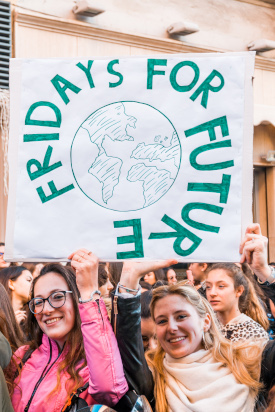
Young people at a climate-focused school strike hold a sign that proclaims “Fridays for Future”. (Photo: Tommi Boom, Fridays for Future Sanremo, Flickr, CC BY-SA 2.0)
CURWOOD: If we're talking about college graduate types here, then typically those folks tend to head off to what, law school or Wall Street or medical school, something like that. And you're saying that climate is attracting them?
DYKSTRA: Well, I'm pretty sure we're still gonna have plenty of lawyers, plenty of doctors, Wall Street is not going to empty out. But people who are concerned about their lives, and their children's lives are more frequently moving to climate change. There's even a government program called the civilian climate corps that's in the making right now to help Gen Zers conserve public lands. A little bit similar to the Civilian Conservation Corps and other programs back in the Great Depression, that gave people jobs and helped out American society at the same time. Climate change, of course, is not just an American issue, but a global issue. The reason I'm a little cynical about all this is that a lot of polls tend to show good intentions on the environment. It's happened for years. Sometimes it doesn't always pan out.
CURWOOD: Hey, let's take a look back at history now, what do you see?
DYKSTRA: A 60th anniversary that's an important date in all history, not just American history. In his first address to the United Nations, September 25 ,1961, President John F. Kennedy told the UN General Assembly quote, "we in this hall shall be remembered either as part of the generation that turned this planet into a flaming funeral pyre or the generation that met its vow to save succeeding generations from the scourge of war."
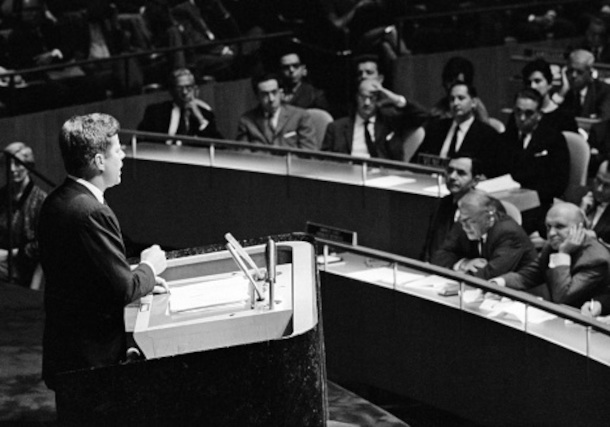
President John F. Kennedy gives his first Address to the United Nations General Assembly on September 25, 1961. (Photo: American Rhetoric, Public Domain)
CURWOOD: Boy, the first part of that statement might have been referring to the climate, huh?
DYKSTRA: And the flaming funeral pyre may have been referring to Light My Fire, The Doors song. But back in 1961, the Cold War was in full bloom. And a year after that, President Kennedy was dealing in October of 62 with the Cuban Missile Crisis, which most historians feel is the closest we've ever gotten to nuclear war so far.
CURWOOD: Yes, it was a close call and let's hope we never get that close again. Thank you, Peter. Peter Dykstra is an editor with Environmental Health News, that's EHN.org and DailyClimate.org. And we'll talk to you again real soon.
DYKSTRA: All right, Steve, thanks a lot. Talk to you soon.
CURWOOD: And there's more on these stories on the Living on Earth web page. That's LOE.org.
Related links:
- Mongabay | “Manatee Deaths In Florida Point To A Global Decline In Seagrass Ecosystems”
- The Guardian | “‘No Point In Anything Else’: Gen Z Members Flock To Climate Careers”
- President John F. Kennedy’s Address to the United Nations General Assembly, delivered 25 September 1961
[MUSIC: Jeff Little, “A” Strange Thing on Piano Man From the Blue Ridge, by Jeff Little, self-published]
CURWOOD: Don’t miss the first fall meeting of the online Living on Earth Book Club this Thursday, September 23 when we will meet Richard Powers, the Pulitzer Prize winning author of Overstory, and talk about his new novel Bewilderment. That is about an astrobiologist raising his son as a single father on a beautiful, imperiled, planet. So join us online on Thursday, September 23 at 7pm, eastern for this event. Sign up at loe.org/events to get details. You can also email a question in advance for Richard Powers to loebookclub@loe.org. That’s loebookclub@loe.org.
[MUSIC: Jeff Little, “A” Strange Thing on Piano Man From the Blue Ridge, by Jeff Little, self-published]
CURWOOD: Coming up – Students, faculty, and alumni force Harvard University to divest its 40 billion dollar endowment from fossil fuels. That’s just ahead on Living on Earth.
ANNOUNCER: Funding for Living on Earth comes from you, our listeners, and United Technologies, combining passion for science with engineering to create solutions designed for sustainability in aerospace, building industries, and food refrigeration.
[CUTAWAY MUSIC: Hot Club Sandwich, “Swang Thang” on No Pressure, by David Grisman, self-published]
Harvard Finally Divests
Student and alumni protesters stormed the field at the 2019 Harvard/Yale football game to call attention to the fossil fuel divestment movement. (Photo: Paul Johansen, Fossil Fuel Divest Harvard)
CURWOOD: It’s Living on Earth, I’m Steve Curwood.
Harvard University recently announced that it will no longer invest in fossil fuel companies. That announcement comes after years of refusal to divest its 40 billion dollar endowment of coal, gas and oil despite a hard push from students, faculty, and alumni to do so. The campaign for Harvard divestment made national news in 2019 when protesters stormed the field during the highly anticipated Harvard-Yale football game.
[SFX PROTEST SOUNDS]
CURWOOD: We recently spoke to two organizers involved in Harvard’s divestment campaign.
SANGANI: My name is Isha Sangani. And I am a student organizer with Fossil Fuel Divest Harvard.
SCHWARTZ: My name is Caleb Schwartz. I'm an alumni of Harvard College, and I'm the coordinator of the Fossil Fuel Divest Harvard Alumni Campaign, class of 2020.
CURWOOD: Isha and Caleb shared what this news means for them.
SANGANI: Yeah, I think for me, it's just very vindicating. We've fought for this for so long. So fossil fuel divest, Harvard has campaigned for 10 years to get Harvard to divest from fossil fuels and arguably, the divestment movement has started long before that. And so to have this happen now is simultaneously, it feels amazing. It feels like a really big victory that we got here and at the same time, it makes me really angry that Harvard took so long to begin with. It took making, you know, a legal complaint to the Massachusetts Attorney General, it took storming a football field during the 2019, Harvard-Yale game, it took countless protests and petitions and the support of faculty and alumni and staff and students in the community. And only then when all of that was on the table did Harvard finally listen to its community.
SCHWARTZ: Harvard missed its chance to be a leader in the fossil fuel divestment movement. They've missed it by several years. You know, back in six years ago, when we were fighting the Dakota Access Pipeline, and went through Standing Rock, Harvard was still investing in the fossil fuel industry. So well, this isn't, you know, necessarily a sign of leadership, it is still massive victory for student activists who moved the world's richest university to do something it said it would never do.
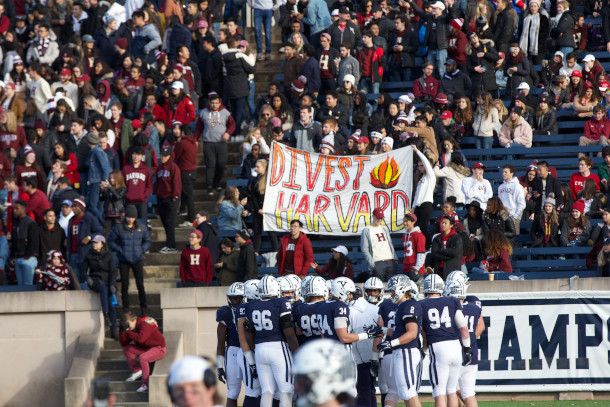
Students at Harvard have been calling for divestment from fossil fuels for over 10 years. (Photo Courtesy of Fossil Fuel Divest Harvard)
CURWOOD: What do you think tipped the balance?
SCHWARTZ: Yeah, so actually, I think the legal avenues that we took as an organization really came into play, especially over the last year or two. So, I think recently, in the past few months, we actually submitted a complaint, like I mentioned, to the Massachusetts Attorney General's office, and specifically, we were saying that Harvard was violating its obligation as a charitable institution, to invest in things that are prudent for its charitable mission by investing in fossil fuels. So, once we filed that complaint, a few months later, this announcement comes out and we realized that some of the language from President Bacow's announcement about, you know, it not being prudent to invest in fossil fuels and about Harvard's fiduciary duty, that directly echoes our legal complaint that we filed earlier. So, we think that the complaint as well as just the mounting pressure in general was what finally caused Harvard to listen to our demand.
CURWOOD: I noticed the official announcement from Harvard didn't use the word divest. Even though that's the word that activists have used for years for this movement and others. Why do you think this is and how do you feel about that?
SCHWARTZ: Yeah, I mean, I really encourage anybody who's interested in the story to go and read President Bacow's letter. What I read in the letter was that Harvard was compelled to do the right thing. They were compelled to do this thing that they said they would never do. They're not coming out and leading, they're not coming out of making the right decision because they want to, they are, you know, they release the read letter on a Thursday evening, which is the best time to release something, if you're looking to not get press coverage over it. They didn't use the word divestment. They didn't mention the thousands of students, alumni and faculty who made this happen, who have been fighting this for years, it was very centered around- oh, you know, we're we're choosing to do this as this, you know, the Harvard Management Company, this small group of people. And they totally misrepresented what the movement was. So, if anything that shows that they're embarrassed that this happened, they're embarrassed that they were forced to do this thing, to do the right thing. And I think that's really telling about, you know, moving forward how we have to fight for climate justice.
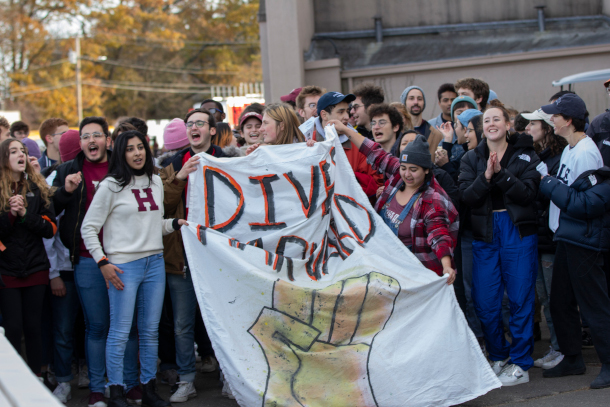
Harvard’s endowment totals more than 40 billion dollars. (Photo Courtesy of Fossil Fuel Divest Harvard)
CURWOOD: And from a student perspective, tell us why it's important to hold companies and organizations accountable for the climate emergency?
SANGANI: Yeah, so I mean personally I believe, and I know a lot of members of fossil fuel divest Harvard believe this too, is that fossil fuel companies are the most to blame for this climate crisis. And it's very sad to see the position that we've gotten ourselves to, because not only are fossil fuels entrenched in our politics, and they're you know, we have ties to them and institutions that we participate in, educational institutions receive funding for programming and research from fossil fuels. But also, we have people that depend on the fossil fuel industry for jobs. And our society is fundamentally intertwined with that. You know, they had this information that climate change was happening decades ago and they chose to instead mislead the public and to do these, these public relations campaigns that actually clouded the link between climate change and carbon emissions in the public's mind.
SCHWARTZ: Yeah, I keep coming back to this quote that I read over the summer. The quote is "The world isn't dying. It's being killed and the people who are killing it have names and addresses". It's a bit of a you know, blunt and direct quote, but I think it really speaks to the fact that there are a small number of people who hold immense amounts of power, who are investing in a very destructive fossil fuel industry in a very destructive future. And it's up to, you know, the masses, the rest of us to push the system in the other direction.
CURWOOD: Isha how did you get involved in divestment? What inspired you to get involved in this movement?
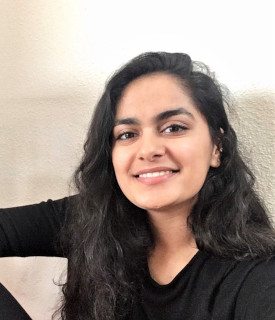
Isha Sangani is a student organizer with Fossil Fuel Divest Harvard. (Photo Courtesy of Isha Sangani)
SANGANI: Yeah so I'm from Seattle, and I remember very vividly in early High School, we had a series of very bad wildfires, you know, we're talking the whole sky’s pink, there's ash over everybody's cars and I think this was August of 2017. And then that year was quite bad and then next year, we had variation of the same thing. And then next year, it got even worse. I realized that climate change was here, and it wasn't going away. And it was only going to get worse from there unless we do something about it as a society. And so when I got to Harvard, I kind of wanted to, I wanted to find a place where I could channel that energy and to act on climate change. And I felt like fossil fuel divest Harvard was the right avenue for me to do that. So I met this amazing community of people. Now we share friendships, but it all kind of stemmed from us all believing in the same things, which is that Harvard investing in fossil fuels is not leading us to adjust in sustainable future that we need.
CURWOOD: Caleb, where are you from? And when did you first come to understand that there's a climate emergency, the climate crisis?
SCHWARTZ: Yeah, I'm from right near New York City. And I think I've always been aware that there is a climate crisis. But I remember vividly, in 2012, when Hurricane Sandy hit, standing with my family in our home, and we were watching outside as you know, the strongest winds and the strongest rains that I've ever seen, were coming into our neighborhood, our house was flooding. And the power lines outside our house were on fire, and the fire was slowly approaching our house. And I just remember being paralyzed with fear. I remember never experiencing anything like that. And I was lucky, my house didn't burn down, you know, we lost a bunch of stuff in the basement, but we were fine. But then the second shock that hit me was seeing all the people that were not fine. I had friends who lost their homes, I had, you know, we my school, took a field trip out to Long Island to help people, you know, clean their rubble out of their houses and there were people who were disrupted you know, potentially are still feeling the effects to this day. So I saw the great injustice of this current crisis at a young age and I think it really cemented in me, personally, the need to do something.
Caleb Schwartz, class of 2020 at Harvard College is the coordinator of the Fossil Fuel Divest Harvard Alumni Campaign. (Photo Courtesy of Caleb Schwartz)
CURWOOD: What do you think might be the ripple effect of Harvard's divestment of fossil fuels, other institutions?
SCHWARTZ: Well, going back to 2019, when our campaign did a really high profile action during the Harvard-Yale game, we disrupted the football game. Yale ended up winning that football game, but this time we'd be held to divestment so hoping that they divest pretty soon. There are so many more rich institutions that need to divest. But I think something about the divestment movement is that it is very accessible, you know, chances are that you are connected to a church or a pension fund, or just your bank, you know, if your bank with Chase Bank, that's the leading funder of fossil fuels. There's so much that we can do to reform, you know, institutions that touch us at every single level of our lives. You know, the fact that some of the worst pipelines in the world, if you look at who owns them, if you look at whose money is in them, it's you know, every day people, it's teachers, you know, pension funds, it's its workers pension funds that invest in a lot of these terrible projects, and not everybody knows that, and people are starting to catch on to this, you know, being this way the system works. So, I think in terms of ripple effects of this victory, I hope, I hope it sends the message that it is possible to do this at so many other places than just you know, stodgy old institutions. That it is possible to get, you know, everywhere to do it, because if Harvard can do it, that this really rich and conservative institution can do it, you know, we can move a lot of other institutions too.
CURWOOD: Caleb Schwartz is a Harvard alumni and coordinator of Fossil Fuel Divest Harvard and Isha Shangani is a student organizer with the group. We reached out to Harvard president Larry Bacow for comment, though he did not reply by the time we went to broadcast. The bank JP Morgan Chase sent us a statement about sustainability but did not address the issue of their financing of fossil fuel projects. You can see full statements from both President Bacow and Chase on our website, loe.org
JP Morgan Chase Statement:
"JPMorgan Chase is helping facilitate the transition to a low-carbon world by implementing a Paris Agreement-aligned financing strategy, and by aiming to finance and facilitate $1 trillion for green initiatives, such as renewable energy and clean technologies - part of a $2.5 trillion target to advance climate action and sustainable development. We are working with clients to help them navigate the long-term economic and environmental benefits of transitioning to a low-carbon world and setting carbon intensity reduction targets. We are also carbon neutral in our business operations.”
Related links:
- President Bacow’s 9/9/2021 Letter about fossil fuel investments to Harvard University
- More on the Harvard Divestment Movement
- Follow Divest Harvard on Twitter
[MUSIC: Miles Davis “So What” on Kind Of Blue, Columbia Records]
Remembering Our Colleague Thurston Briscoe
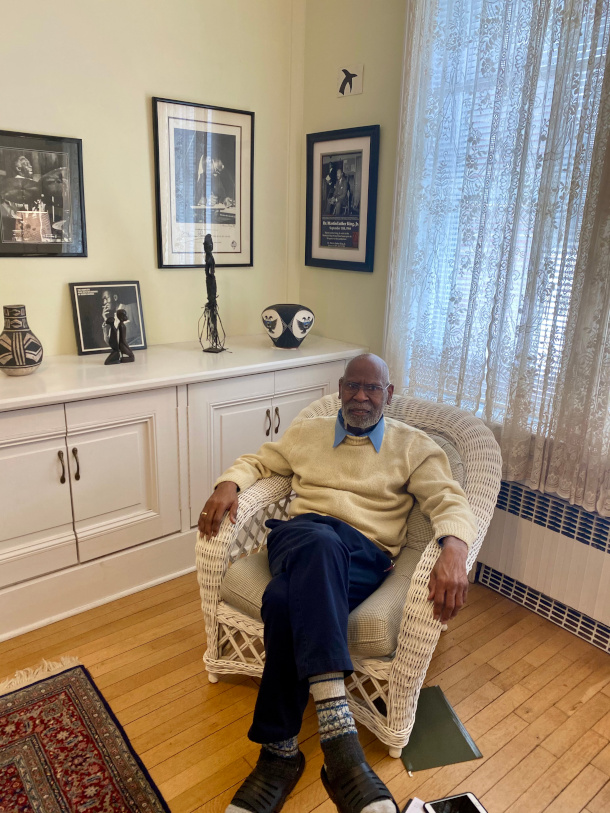
Thurston Briscoe in his home music room, one of his favorite places in his house. (Photo Courtesy of Becca Pulliam)
CURWOOD: On August 16th Living on Earth lost a dear friend and colleague, producer Thurston Briscoe. Alzheimer’s Disease and the advancing throat cancer that would take his life had forced Thurston to retire 18 months earlier as vice president of Living on Earth’s governing board, the World Media Foundation, as well as our station representative. He joined us after a long career in public radio as a station program manager and a producer of leading nationally broadcast jazz programs. After college Thurston began as jazz host and public affairs producer at KLCC in Eugene, Oregon, and then came to NPR in Washington DC in 1980 where I was lucky to meet this kind and gentle man with a much neater afro than mine. Thurston would eventually run the arts unit for Morning Edition and have a hand producing NPR’s Jazz Alive! Don Lee worked in the NPR arts unit back then and began a close friendship with Thurston.
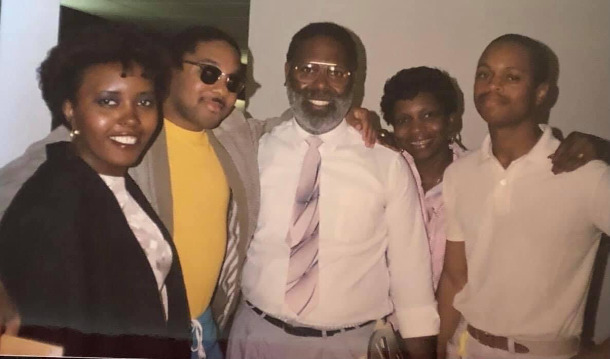
Thurston Briscoe (center) with his former intern Eugene Holley (far right of photo), two NPR employees and jazz musician Wynton Marsalis (second from left). (Photo Courtesy of Eugene Holley)
LEE: He was great in all ways. He was resourceful; he was efficient; in a lot of ways, he was a teddy bear to work with but he could also be very challenging and stubborn if he wanted to be; fortunately for me that didn’t turn out to be the case very often in our relationship. But he was a guy who had your back. If it was my problem, he was there to share it equally.

Dee Dee Bridgewater when she was host of JazzSet and Thurston Briscoe, taken at WBGO at least 10 years ago. (Photo Courtesy of Becca Pulliam)
CURWOOD: And as Don Lee recalls, Thurston didn’t see music and theatre as mere infotainment.
LEE: We were not there to do puff pieces. We were there to apply the same journalistic principles to arts coverage that a news reporter and a news editor would apply to foreign affairs, or environmental concerns. And he was interested in looking at the broad appeal of a particular subject; he was interested in the angle that it took if it was a stage work for example, does it deal with current affairs, with real life concerns? And what’s the critical reception – is it worth the public’s attention?
CURWOOD: Thurston later ran programming and supervised on-air personnel for two decades for arguably the best jazz station in the public radio system, WBGO in Newark New Jersey, where he brought those same critical skills. Becca Pulliam worked with Thurston for decades, first at Jazz Alive and then at WBGO producing nationally distributed shows like Jazz Set with Branford Marsalis and DeeDee Bridgewater. Becca recalls Thurston loved to tap out rhythm and would see stories in the music, even the instrumentals.
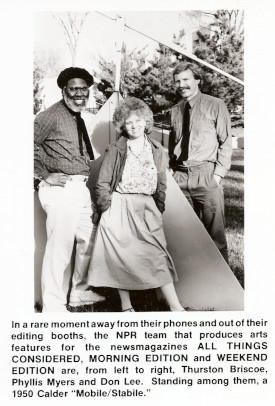
NPR publicity photo of the Morning Edition Arts Unit in the mid-80s. (Photo Courtesy of Don Lee)
[MUSIC: Miles Davis “So What” on Kind Of Blue, Columbia Records]
PULLIAM: Kind of Blue was his favorite album, of course, Miles Davis, which is every everybody's favorite album, but for very good reasons. He loved Miles Davis.
[MUSIC: Miles Davis “So What” on Kind Of Blue, Columbia Records]
CURWOOD: She says he was also enchanted by singers.
PULLIAM: Thurston was following the record releases and re-issues of the time and he just loved a real, real strong voice like Dinah Washington, Dee Dee Bridgewater, Nancy Wilson.
[MUSIC: Nancy Wilson, "When I Look in Your Eyes" on Easy, Capitol Records]
CURWOOD: Thurston did not have any children, but came to dote on John, the grandson of his longtime partner for the last two decades, Nia Gill, a New Jersey state senator. I had a final question for Don Lee.
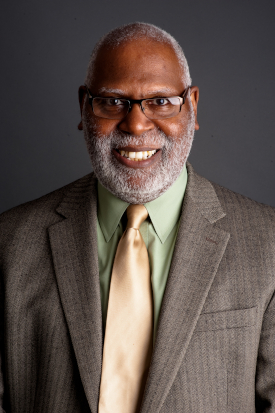
Thurston Briscoe. (Photo: Michael Weintrob)
So, if Thurston Briscoe decided to come back on the planet for just a little bit. What would you ask him?
LEE: I'd ask him about jazz. I'd ask him -- I'd ask him what was heaven like? Because if there is one, I know he's been there. He was a wonderful guy. And, and I really miss him.
CURWOOD: And let me say now Thurston, thanks for all. We miss you and mourn you and now celebrate you the best way we know how, with this cut from Kinda Blue called Blue in Green.
Related links:
- Thurston Briscoe remembrance by WBGO
- Obituary of Thurston Briscoe in Montclair Local
- Thurston Briscoe Remembrance by DownBeat Magazine
- Learn more about Thurston Briscoe’s view on radio and radio production from an interview excerpt
[MUSIC: Miles Davis Blue and Green” on Kind Of Blue, Columbia Records]
CURWOOD: Living on Earth is produced by the World Media Foundation. Our crew includes Naomi Arenberg, Bobby Bascomb, Paloma Beltran, Anna Canny, Jenni Doering, Jay Feinstein, Mark Seth Lender, Don Lyman, Aynsley O’Neill, Jake Rego, Genevieve Santilli, Teresa Shi, Joshua Siracusa, Tivara Tanudjaja, Gabriell Urton, and Jolanda Omari. Tom Tiger engineered our show. Alison Lirish Dean composed our themes. You can hear us anytime at L-O-E dot org, Apple Podcasts and Google Podcasts, and like us, please, on our Facebook page - Living on Earth. We tweet from @livingonearth. And find us on Instagram at livingonearthradio. I’m Steve Curwood. Thanks for listening!
ANNOUNCER: Funding for Living on Earth comes from you, our listeners, and from the University of Massachusetts, Boston, in association with its School for the Environment, developing the next generation of environmental leaders. And from the Grantham Foundation for the protection of the environment, supporting strategic communications and collaboration in solving the world’s most pressing environmental problems.
ANNOUNCER 2: PRX.
Living on Earth wants to hear from you!
Living on Earth
62 Calef Highway, Suite 212
Lee, NH 03861
Telephone: 617-287-4121
E-mail: comments@loe.org
Newsletter [Click here]
Donate to Living on Earth!
Living on Earth is an independent media program and relies entirely on contributions from listeners and institutions supporting public service. Please donate now to preserve an independent environmental voice.
NewsletterLiving on Earth offers a weekly delivery of the show's rundown to your mailbox. Sign up for our newsletter today!
 Sailors For The Sea: Be the change you want to sea.
Sailors For The Sea: Be the change you want to sea.
 The Grantham Foundation for the Protection of the Environment: Committed to protecting and improving the health of the global environment.
The Grantham Foundation for the Protection of the Environment: Committed to protecting and improving the health of the global environment.
 Contribute to Living on Earth and receive, as our gift to you, an archival print of one of Mark Seth Lender's extraordinary wildlife photographs. Follow the link to see Mark's current collection of photographs.
Contribute to Living on Earth and receive, as our gift to you, an archival print of one of Mark Seth Lender's extraordinary wildlife photographs. Follow the link to see Mark's current collection of photographs.
 Buy a signed copy of Mark Seth Lender's book Smeagull the Seagull & support Living on Earth
Buy a signed copy of Mark Seth Lender's book Smeagull the Seagull & support Living on Earth

